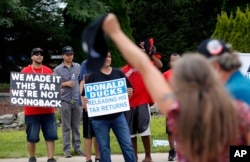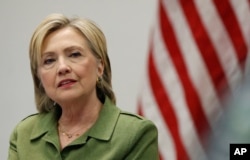Republican presidential candidate Donald Trump says he is holding firm in his views to deport 11 million undocumented immigrants living in the United States, one of his main campaign planks in the November election against Democrat Hillary Clinton.
"I'm not flip-flopping," Trump told Fox News a day after his new campaign manager, Kellyanne Conway, said in another interview that Trump's deportation plans were "to be determined."
Trump, a New York real estate tycoon, said, "We want to come up with really fair, but firm answer" on immigration policies.
"We have to be very firm," Trump said. "We have to be very, very strong when people come in illegally. We have a lot of people that want to come in through the legal process. It's not fair to them."
Trump said he is "working with a lot of people in the Hispanic community to come up with an answer."
Build a wall
Trump's deportation plan, along with his call to build a wall along the southern U.S. border with Mexico to halt the stream of undocumented migrants entering the country, helped fuel his run to the Republican presidential nomination.
Trump plans to talk about his immigration policies later in the week, according to one of his sons, Eric.
"My father’s immigration plan is pretty simple," Eric Trump said. "He wants secure borders. You have to know who’s coming into the United States of America. You can't let people come in unchecked. We have 100 million people in this country that are out of the workforce. Right? I mean we have manufacturing jobs in this country have gone down one-third since 2000. We're losing jobs across the board, yet people are walking in unchecked and we don't know who they are, and they could be ISIS," a reference to Islamic State jihadists.
Trailing in polls
Donald Trump is badly trailing Clinton among minority voters, according to national political surveys. In the past few days, he has been making a new pitch to court support among African Americans and Hispanics.
He told a largely white crowd of supporters in the Mid-Atlantic state of Virginia on Saturday he recognizes that "outreach to the African American community is an area where the Republican party must do better, and will do better."
He noted the party's history, with the first Republican president, Abraham Lincoln, freeing slaves in the mid-1800s. "I want our party to be a home of the African American voter once again," Trump said.
He also met over the weekend with a group of Hispanics advising his campaign. According to several people who attended the gathering, he told them he wants to develop a "humane and efficient" way to deal with the undocumented immigrants living in the United States, the majority of whom are Hispanics from Mexico and Central America. Trump has accused Mexico of sending rapists and criminals across the southern U.S. border.
Mostly white rallies
Trump's efforts in recent days to court black voters before mostly white political rallies have come after he declined invitations in recent weeks to speak to the NAACP, the country's most prominent civil rights group, and a group of black and Hispanic journalists, both of which Clinton addressed.
National political surveys show Clinton has amassed huge leads among black and Hispanic voters, with Trump's support among blacks registering only in the low single digit percentages and one poll showing he has only marginally better support among Hispanics, about 14 percent.
Yet Trump, often given to boastful claims, told one rally that if he wins the presidency in the November 8 election and runs for re-election in 2020 he would win 95 percent of the black vote.
"I will produce for the inner cities, and I will produce for the African Americans," Trump said. "The Democrats will not produce, and all they've done is taken advantage of your vote. That's all they've done. And once the election's over, they go back to their palaces in Washington, and you know what, they do nothing for you, just remember it."
Less than three months before the election, Clinton holds a 5.5 percentage point edge over Trump in several national surveys, according to the political web site realclearpolitics.com. But U.S. political analysts say she holds a significant edge in a collection of battleground election states where the outcome of the quadrennial presidential race is likely to be decided.
Race for White House
In the United States, the race for the White House is not decided by the popular vote, but rather in the Electoral College, where the voting is determined by the outcome in each state, weighted according to its population.
Clinton has been off the campaign trail for several days, concentrating her efforts on major fundraising events, meeting wealthy donors in Martha's Vineyard, a summer playground along the Atlantic Ocean in the northeastern state of Massachusetts.
On Tuesday, she is attending a Los Angeles fundraising lunch hosted by pop singer Justin Timberlake and prominent Hollywood figures that costs $33,400 per guest. Then she heads back across the country for more fundraising in the wealthy Hamptons area of Long Island outside New York.







